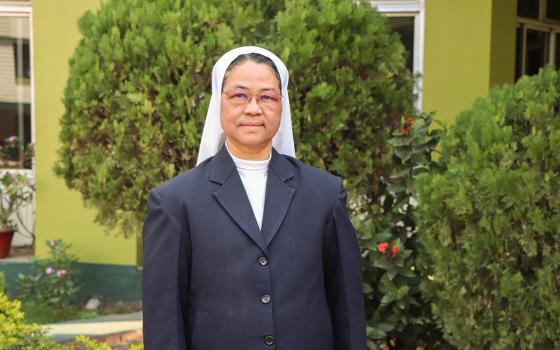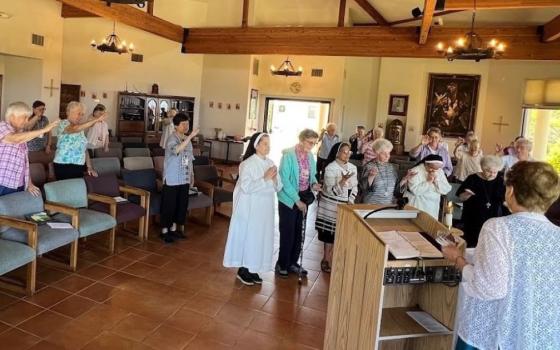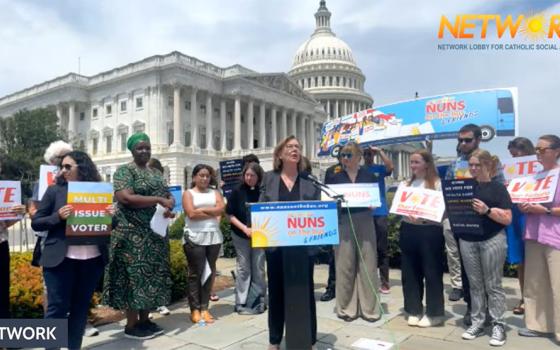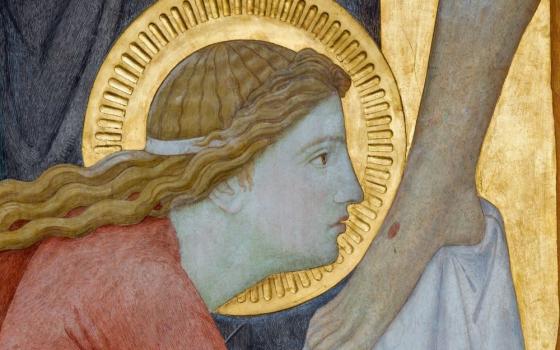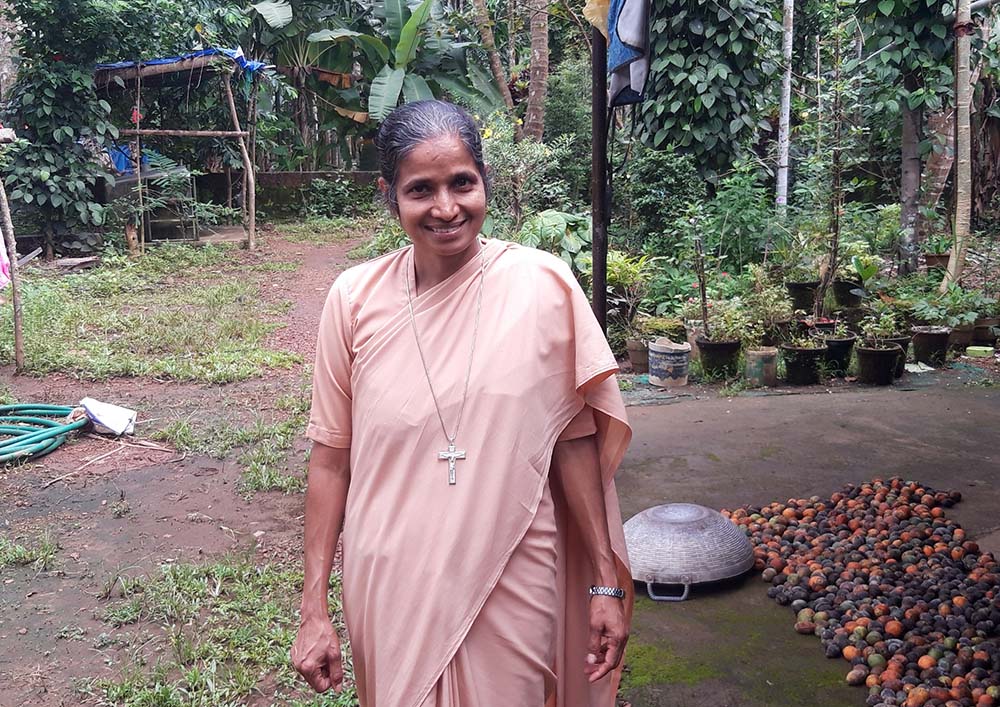
After escaping Afghanistan, Sr. Theresa Crasta, a Maria Bambina nun, on Sept. 9 went to visit her family home at Bela, a village in Kerala on the border of Karnataka state in southwestern India. Her home is next to a farm developed by her father, who died in May. Crasta has now returned to her convent in Mangalore diocese to await reassignment. (Thomas Scaria)
Sr. Theresa Crasta is the only woman religious from India who was rescued by the Indian government from Afghanistan in August after the Taliban captured Kabul. Crasta belongs to the Congregation of the Sisters of Charity of Sts. Bartolomea Capitanio and Vincenza Gerosa, or Sisters of Maria Bambina, an Italian congregation that was involved in educating special needs children in Afghanistan.
Crasta comes from Bela village under the Mangalore Diocese in Kerala on the border of Karnataka state in southwestern India. The 49-year-old nun went to Kabul, capital of Afghanistan, in 2018 after her silver jubilee in the congregation. She served in the only special needs school of its kind in Afghanistan set up by men and women major superior groups in Italy.
After her rescue and two-week quarantine, she visited her family home in Bela and very recently has returned to her Holy Angels Convent, also known as Belvedere, in the Mangalore Diocese to await reassignment.
Crasta shared with Global Sisters Report her experiences of working with special needs children in Afghanistan as well as her rescue from the war-stricken country.
GSR: How do you feel after your evacuation from Afghanistan?
Crasta: When I look at my mother and family members, I feel happy that I returned safely, but when I think about my children in Afghanistan, I really feel sad and miss them.
To be honest, I really did not want to come back. Even when my father died in May this year, I opted not to come. But after the sudden fall of Kabul to the Taliban, there was no option but to leave. I thank everyone who had helped me get out of that country.
Why did you choose to work in Afghanistan? Were you not aware of the dangers involved?
I landed in Kabul November 1, 2018. No one had forced me to go there. I knew the situation in Afghanistan and the dangers involved before I chose to go there. In fact, I had been contemplating seriously on a much more challenging situation for my mission after completing 25 years in the congregation.
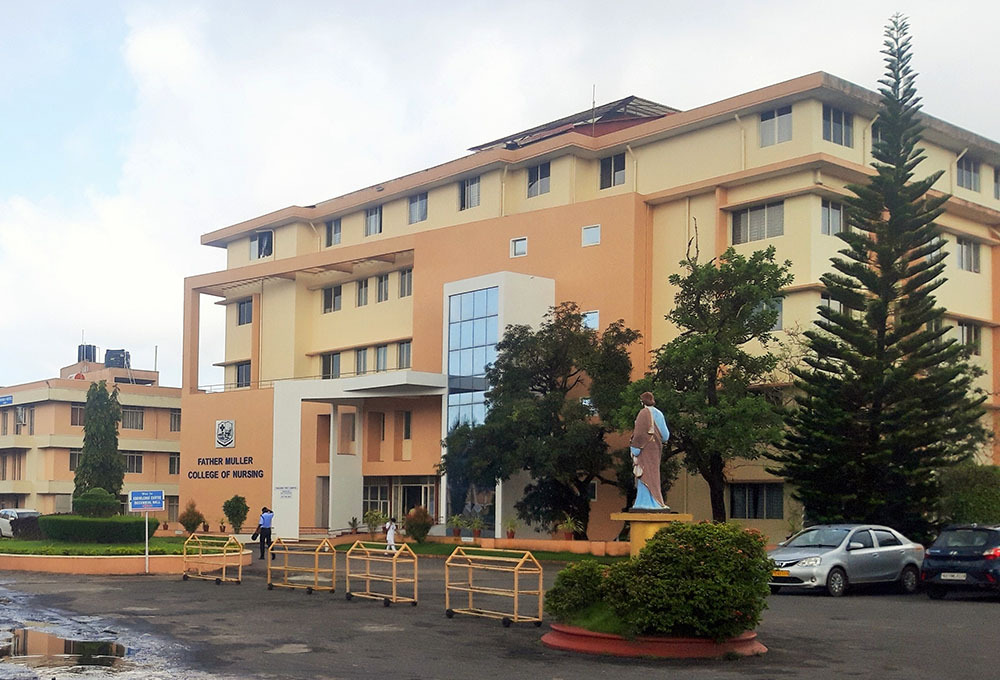
Sr. Theresa Crasta, a Maria Bambina nun, studied here at Father Muller College of Nursing in Mangaluru, southwestern India. Later, before leaving on mission to Kabul, she earned her one-year diploma in special education at St. Agnes Special School in Mangaluru, managed by Apostolic Carmel Sisters. She served as the principal of a special needs school in Kabul until the Taliban captured Afghanistan on Aug. 15. (Thomas Scaria)
At the same time, our superior general in Italy had called for volunteers to join an intercongregational mission in Afghanistan. I was deeply touched by a sentence in the letter that hinted about a possible closure of a children's school in Kabul for want of volunteers. The special school was started in 2005 by the Italian mission, "Pro Bambini di Kabul," in response to a call given by Pope John Paul II during his Christmas message in 2001.
My family and many co-sisters were against my going to Afghanistan, but my superiors gave me permission after I expressed my desire to work in that dangerous country. I believe it was God's plan that I work in Afghanistan and it was his grace that I came back safely to continue my journey.
How did you develop an interest in working with disabled children?
I am a trained nurse and my congregation asked me often to take care of the sick. I was interested in working with children, although most of my time was spent in attending the aged and orphans at [St. Joseph] Prashanth Nivas, a home for the destitute run by our sisters in Mangaluru.
After my superiors learned about my desire to work with the mentally challenged children, I was trained at St. Agnes Special School in Mangaluru and allowed to work among women and children affected by physical and mental disabilities at our institution in Nellyadi, some 45 miles from Mangaluru. That job helped me understand the needs of the special children. This background gave me confidence to work in Afghanistan.
What did you do in Afghanistan?
I was the principal of the school that had 50 special needs children ages 6 to 10. This was the only school of the kind in Kabul, and it was recognized by the [Afghanistan] Ministry of Education.
The children had various challenges, such as autism, mental retardation, and physical handicaps. Parents dropped them to school at 7:30 a.m. Some were picked up by our school van. We prepared the children in basic education, engaged them with play therapy, provided good food and cared for them. Classes went until 2:30 p.m. and parents would come to take them home.
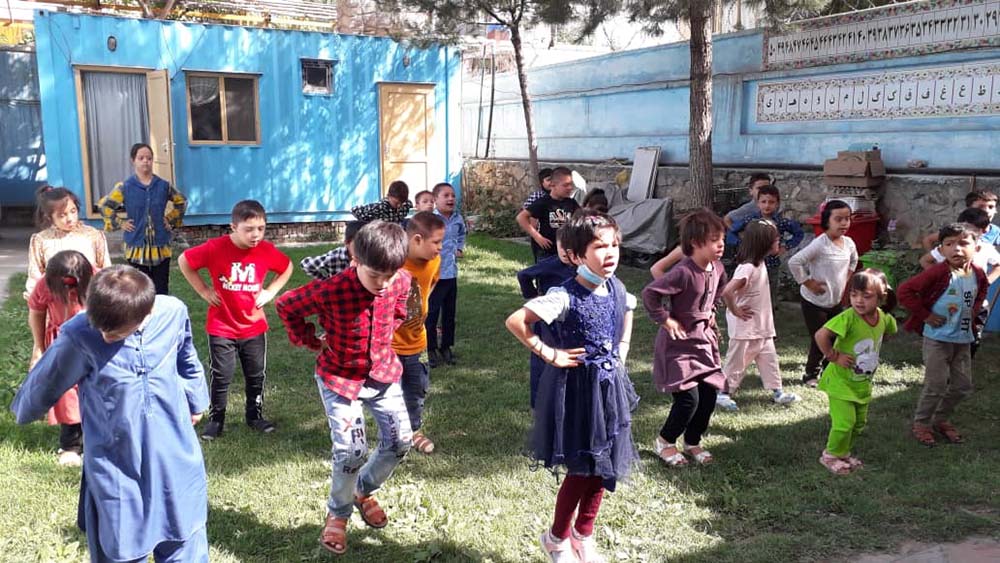
Children engage in activity at Pro Bambini di Kabul, a school for special needs children in Afghanistan. Sr. Theresa Crasta, a Maria Bambina nun from India, was its principal until the Taliban captured Kabul on Aug. 15. (Courtesy of Theresa Crasta)
We were two sisters, the other was Sr. Shahnaz Bhatti of Pakistan, a member of the Sisters of Charity of St. Joan Antida in Italy.
What was the impact of your work on the special needs children?
During my three years, I could observe some positive changes in the children's behavior, socializing skills, attitudes and expression of their hidden talents. Children loved to come to the school and they participated in various activities, such as singing, playing, gardening and studying. Helping them to be self-reliant, at least to manage their basic needs, was the main focus of the school.
Through the children, we could also reach out to their parents with occasional parent-teacher meetings, where many expressed happiness over their children improving in many aspects. Sometimes, teachers from other schools visited us as part of their training.
But more than the changes in them, the children have brought many changes in me as a religious sister. I have learned that children anywhere in the world are so innocent and lovable, and we never get tired of taking care of them. I really miss them.
Please share your experience on Aug. 15, when the Taliban took over Kabul.
Things were somewhat normal until that day, although everyone knew something inevitable would happen after the U.S. Army left Afghanistan. But we never thought we would need to leave everything so soon. I was not afraid, but the fear and anxiety among our teachers have really shaken me.
One of our teachers had gone to the emigration department to help with my visa extension on that morning. She did get the visa extension letter, but by then the Taliban was already in Kabul and chaos ruled everywhere. She could not return, as no taxi was available. She had to literally walk, crying and terribly frightened, amid terrifying scenes. The local women were more frightened than the expatriates.
On that day, our school was opened as usual and the kids had arrived. Our first concern was about the safe return of the children to their homes. Parents could not reach the school for hours, but, somehow, they could pick up the children by late evening.
Advertisement
Uncertainties prevailed for the next few days and some Jesuit priests coordinated our rescue mission. Meanwhile, the Italian embassy helped evacuate the Mother Teresa sisters, who lived next door, with their orphans to Italy.
Please recall your evacuation to India.
The Indian embassy took swift action to evacuate its citizens and asked us to register our details in the embassy portal. I registered my name and number and received a call to be ready for evacuation at any time. But we were not able to travel to the airport and days and nights passed without any hope.
Finally on Aug. 23, we were asked to assemble at a wedding hall near the airport and the embassy sent a vehicle to pick up me and four others from the location. The most difficult and dangerous part was the journey to the airport.
We could hear gunshots and sounds of explosions, see thousands of people desperately screaming and trying to escape from their own motherland. In this turmoil, I did not know whether to cry or laugh as we were safely evacuated by the Indian mission.
We were first taken to Dushanbe in Tajikistan by an Indian Air Force aircraft and then brought to Delhi on a commercial flight. We had to be in quarantine for two weeks there.
I could reach Mangaluru Sept. 7, a day before the Nativity feast. For us in Mangaluru, the Nativity feast is a homecoming and family occasion. God helped me to be with my community on the birthday of Mother Mary.
The Italian mission evacuated Bhatti and the staff and their family members to Italy.
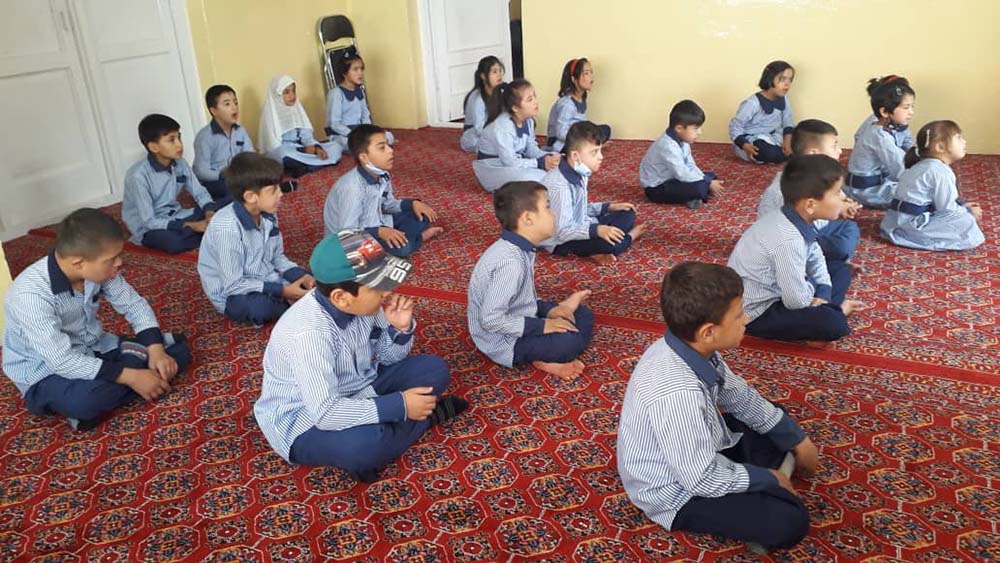
Children attend Pro Bambini di Kabul, a school for children with special needs in Afghanistan where Sr. Theresa Crasta, a Maria Bambina nun from India, served as the principal. (Courtesy of Theresa Crasta)
In the context of the new political conditions in Afghanistan, how would you see the future of the children you cared for?
I think the mission is accomplished and we have safely handed over the children to their parents with some qualitative changes in their lives. I am happy they are back to their families and the parents will take care of them. Their school may not open again, but some foundation for their lives has been laid and I hope they will do well.
How about the teachers and other staff who served your school?
We had some 10 staff, including teachers, security guards, a cook and a caretaker. They were really frightened about their future. Fortunately, the Italian mission decided to evacuate them with their families and flew them to Italy. Only one staff person could not reach the airport and was left behind.
How do you see the fate of Afghan women as the new government takes over?
I could really see the fear in their eyes and I can never forget those faces on the day when the Taliban took over Kabul. Some lucky ones who worked with foreign missions could reach other countries, but most women are stuck in their homes with no hope of freedom and dignity.
Although the new government has promised to give some freedom to women, they are really scared. At one point, the government said schools can be reopened, but no students and teachers dared to show their faces there.
Afghan women had enjoyed relatively good times during the past two decades and many have become educated, empowered and employed. More than the children, I feel for the women in Afghanistan now.
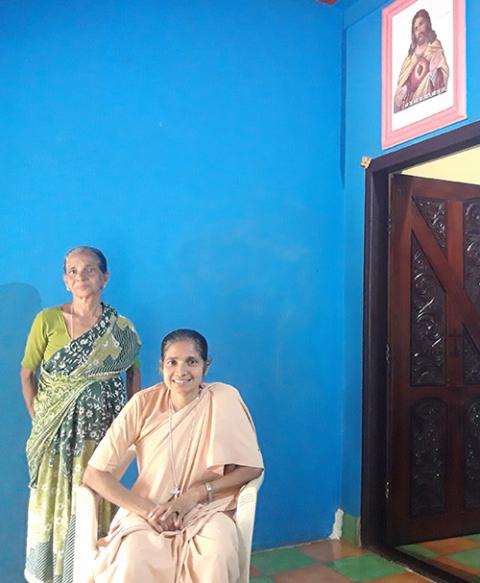
Sr. Theresa Crasta, seated, visits her mother at her home in Bela, a village in Kerala on the border of Karnataka state in southwestern India, after escaping Afghanistan. (Thomas Scaria)
Would you like to go back to Afghanistan, if the situation improves and your congregation reopens the children's home?
Of course I will. I am not afraid of death. My only prayer is not to be left half dead or handicapped. [She smiles.] I know my mother will never let me go again to Kabul, but she had already given me to God and cannot bargain.
I really enjoyed being in Afghanistan, and everyone with whom I worked has increased my faith in God and strengthened my vocation.
How did you find the Afghan people? Was your Catholic nun's identity a help or hindrance?
Although we were in the local dress, many knew we are Christians and we had come to help them. Our staff knew we are religious sisters. Our religious identity never interfered in our work. The people rather respectfully called us sisters.
I have found Afghan people are kind and gentle, not the way many outsiders think. They really liked Indians; we could see this consideration everywhere. I don't know why. In the security check-ups, they let Indians go without much checking. In the government offices, they treated us well. In shops, they gave us new currency notes. I never lived in fear and anxiety in Afghanistan, except in the last one week.
Were you in touch with other Catholic priests and nuns working in Afghanistan? How did you make contact?
Yes, we used to gather at least once a month. We had the Mother Teresa sisters in our neighborhood. And the Jesuits who worked in the refugee relief services also were not far from Taimani [an area of Kabul], where we had the school.
One beautiful experience of religious life was our diversity. Pro Bambini di Kabul is an intercongregational project and we from different congregations lived in one convent with one identity and mission. Initially, we were three sisters from three congregations and nations and, most of the time, we were just two.
[Thomas Scaria is a senior journalist based in India who has worked in Sri Lanka until recently in an intergovernmental organization. He has written for the Union of Catholic Asian News since 1991 and received its 2000 Best Reporter award. He also writes for Matters India, a news portal that focuses on religious and social issues and collaborates with Global Sisters Report.]

